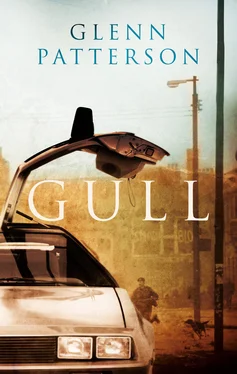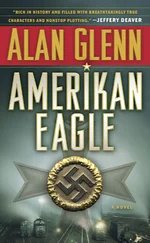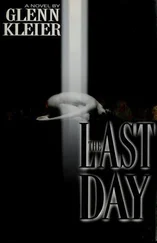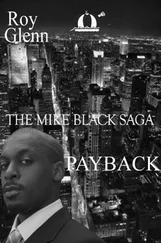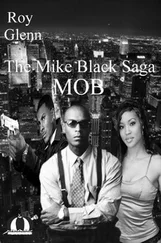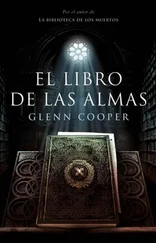‘Let me show you,’ he said, and turned back to the counter where he slipped the vinyl from the third sleeve, displaying it front and back beneath a lamp. ‘First pressing. See? Not a mark.’
Randall laughed awkwardly. ‘All I need to know is does it have “Nightmare”.’
‘They nearly all have “Nightmare”. Do you want to have a listen?’
He still had better than twenty minutes before his train was due. ‘All right.’
The man had already raised the lid of the turntable behind the cash register. He positioned the record on the rubber mat then bent over to place the stylus on the groove — an operation as precise as cutting the diamond the stylus had come from. He took an untipped cigarette from the box in his shirt pocket — this too appeared be part of the operation — and with a nod of his head — for that was not mere hiss they were hearing, that was the sound of the forces gathering and could not be talked over — invited Randall to join him. Randall nodded back — he would, sure — and lit up with him, two sides of the same flame.
The kids looked over their shoulders curiously at the first funereal notes from some enormous horn. A whole shipful of bad news. Trumpets came in, harsh as sirens, then a clarinet — Artie himself: the sound of one man trying to steer a course through the confusion.
Randall remembered the night sitting in the grillroom in — where was it? — Manhattan Beach — DeLorean’s hands making the shape of the clarinet, though perhaps it was something far more intangible he was trying to conjure… those stories of his childhood on Six Mile Road — parents striving to live decently, clarinet lessons and a piano in the parlour, despite the goons and the summer lay-offs — his first days at Packard and the awe he felt in the presence of the actual makers — not the machine-operators — the craftsmen, who knew, and knew that everyone from the goddamned president down knew, their proper worth.
The track ended at the same time as the cigarette. Randall’s head was whirling with the strength of the tobacco, the intensity of the music, the combination of the two. The man lifted the stylus with even more care than he had set it down.
‘Imagine someone with that much talent just walking away.’
‘Who walked away?’
‘Artie Shaw. Hasn’t played in twenty-five years. Story is he couldn’t bear the prospect of hearing his powers diminish night after night.’ He eased the vinyl back into its inner sleeve. The barest whisper of a contact. It would still have been pristine in 2001 if he never let it out of his hands.
He laid the LP flat on the counter. ‘What do you think?’
‘I’ll take it,’ said Randall.
‘Buy or borrow?’
‘Oh, listen, I couldn’t borrow it, thanks all the same.’
‘Read the sign,’ the man said and pointed, and sure enough, there it was, black on fluorescent yellow: Record Library . ‘Ten bob to join and ten bob up to three LPs a week.’
Randall already had his pocketbook out. ‘Ten bob is…?’
‘Fifty new pence.’
So Randall gave the man a hundred of them in the shape of a Bank of Ireland pound note, took the first pressing just demonstrated, another slightly more dog-eared Artie Shaw, plus a Stan Getz potluck ( Groovin’ High ) and crossed the road again — by the lights this time: never mind it had only cost him a pound, he had a valuable cargo under his arm — to the station.
A couple of days later, just before noon, with Don in Hethel for a meeting, he was passing his office window on his way to the filing cabinet when he noticed a large number of workers weaving between the cars in the parking lot, headed in the direction of the Twinbrook gates. His first instinct was to pick up the phone to June in the office down the hall. ‘Did I miss something? Has there been a fire drill?’
She hesitated before replying. ‘A fire drill…? No.’ There was a lot of background noise, chair legs scraping across the floor, footfalls in the corridor. He checked the window again — still men and women leaving in their scores — then put down the phone and made his way across to the assembly shop. For a moment he thought it was completely deserted, but then his eyes lit on a worker here and a worker there and somewhere else again two or three where he would have expected to see six or more, tinkering, all of them, rather than working.
Two men came round the corner from the chassis line intent on the door.
‘Can one of you tell me what is going on here?’ Randall asked, but the men only put their heads down and carried on around him. He turned. ‘I am talking to you!’
They didn’t stop, if anything speeded up. He began to jog. And then the next thing he was running, back through the shop, out the door, calling out to people who continued to ignore him. ‘You do not have permission to leave this factory in working hours… I insist that you return to your work station immediately!’
He spied Stylianides at his office window and followed the direction of his gaze. Placards were being waved outside the gates — the same placards that were waved as the car carrying the DeLoreans sped through — Victory to the Prisoners, Support the 5 Demands — except there was something almost jaunty in the motion today, the workers as they exited being greeted with clapping and cheering. The loudhailer was there again too, although the voice that came from it on this occasion evidently belonged to someone (Randall from that distance, with that distortion, could not have said who) from within the workforce.
‘Volunteer Bobby Sands refused food yesterday morning in his cell in H2 of Long Kesh. We, the workers of the DeLorean Motor Company Limited, wish to express our solidarity with him and with all the brave men and women willing to sacrifice themselves for political status in the British concentration camps here.’
Randall had heard enough. It was only with an effort that he kept his whole body from shaking as he marched back to his office. He met Stylianides at the head of the stairs.
‘We need to get the name of every woman and man who walked out of that gate,’ he said, pointing back the way he had come.
Stylianides shrugged. ‘Sure, but maybe to save time we could collect the names of the ones who didn’t.’
*
It had to have been prearranged. Liz did not hear an actual command, but all at once, from all corners of the factory, there was a sound, beyond the simple downing of tools, of labour being definitively withdrawn.
Liz glanced over her shoulder, back up the line, and when she turned around again Anto and TC were walking too.
‘Here!’ she said, as in ‘Come back… now .’
Anto held up his hand — I hear you, but I’m not going to heed you — kept walking, on up past the Tellus terminal, left, out of sight.
She looked about her and registered it almost at once, the ones left standing — standing like her, like spare parts — they all came in through the Seymour Hill gate. She knew then right away. Robert had said to her this morning that there would be bother, just wait and see, but there had been a hunger strike at the tail end of last year and things had carried on in the factory as normal. To be honest Liz had hardly paid it any attention at all. There had been a couple of awful incidents in England a few years ago — they didn’t stand for any nonsense there, Robert said — hunger strikers choking while being force-fed — but in her experience these things usually petered out, as that last hunger strike did in… Do you know, she couldn’t even have told you when exactly.
The protests, right enough, had not let up — she had seen that first-hand — and the priests and what have you that were always in and out of the prison had been saying every opportunity they got that next time they worried it would be ‘for real’, but she had thought that was just the prisoners upping the ante, hunger-striking at one remove.
Читать дальше
